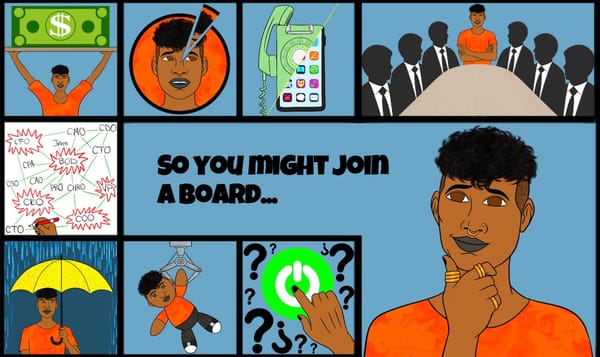sales tax on live presentations
get in, we're making sense of tax law

Last updated: November 9, 2025. I made changes to these sections: affiliated groups; reseller's permit; listening sessions; advertising and IT services.
Washington's state budget is facing another shortfall! The goons who spent decades fighting a state income tax did their work well. Instead of an income tax, property and state taxes make up the bulk of what we use to pay for state services. Both of these, of course, flow free in a recession and hit poor people the hardest. In Seattle, our sales tax on retail goods is a whopping 10.35%. It may soon go even higher across the state. One new law allows localities to raise sales tax another 0.1% to hire police or pay for related services.
Another change the state made earlier this year is a new sales tax on many services, including "live presentations." These presentations can include “lectures, seminars, workshops, or courses.”[1] People who take part in these presentations must attend in-person or virtually. The DOR already considered pre-recorded presentations or trainings as retail sales; those were already sales taxable. The audience members and the presenter must discuss or exchange information in real-time.[1:1] These taxes go into effect for work beginning Oct 1, 2025. The person I spoke with said there was a grace period for longer-term projects that started before then.
As a consultant who offers facilitation and training services, I needed to know more. I suspect that many of my friends and colleagues are also curious about this new tax. I've been reading through Department of Revenue (DOR) materials for weeks now trying to make sense of it all. This is legal stuff, and I’m famously anti-laws (half-joking... three-quarter-joking). I’ll summarize both my question and their response, then quote their actual ruling. Please do your own research and consult a lawyer or tax professional if you need to. You can also contact the DOR for help, like I did, a few times now! Here's what I've learned so far.
The law states that people who charge for live presentations must also charge a sales tax. Presenters pay those taxes at whatever frequency they already file taxes. That could be monthly, quarterly, or annually depending on your business income.[2]
obtaining a tax ruling
If you have questions about your state taxes, talk to the folks at DOR[1:2]. All you have to do is request a tax ruling[3], provide information about your business, and submit a question. So far I've found it's helpful to be as specific as possible. A tax specialist at the state will review your answer and give you a specific recommendation on what to do. If you have follow-up questions about your tax ruling, you can reply to the email you receive. You can also request a review if you disagree with their ruling.
types of consulting services
The taxability of consulting services depends on the primary purpose of the consulting. This is also true of services such as listening sessions. The DOR draws a distinction on what's taxable by the industry my consulting services are for. If I consult about a client's IT or marketing needs, I charge sales tax.[1:3] If I'm consulting with them about improving their business operations, I don't.
I talked to someone over the phone who told me that she considered most of my community engagement facilitation to be taxable as "marketing services." I did not ask about strategic planning work but I think those fall under "business operations services." Those are therefore not taxed (because I pay B&O taxes for that income). I'm now asking for a specific ruling about strategic planning work, the other major category of work I do.
The DOR writes:
For example, if you are consulting with respect to the client’s information technology infrastructure or marketing, it is considered information technology or advertising services and is a retail sale. However, if you are consulting with respect to how to improve business operations, the charges are subject to B&O tax under the Service and Other Activities classification and is considered apportionable income. You do not have to collect sales tax on apportionable income.
listening sessions
Listening sessions are a big part of my work so I wanted a detailed ruling on whether I charge sales tax for them. I described my listening sessions as one part of a larger package of services I give to clients. Though information is exchanged, it is not a live presentation and therefore not sales taxable.
The DOR writes:
The example of the listening session you hosted for a nonprofit client on gun violence appears to be part of your broader consulting services and is not considered a live presentation. This is because the purpose of the listening session is to gather information and provide feedback to [redacting my specific example]. Income from the listening session you described above is subject to B&O tax under the Service and Other Activities classification and is apportionable.
advertising and IT services
I don't typically consider my work to include advertising and IT services, but I wanted to make sure. IT services do include project management, but only the management of those IT services. Advertising services are less "in service of an advertising firm" and more "activities an advertiser would do." This includes things like creating and marketing ads.
The DOR has interim guidance statements for both categories. If either of these services are work you perform, check out their guidance for IT services and advertising services.
subcontractors
As a consultant, I bill clients for the work I perform for them. I also work as a subcontractor, where I bill another consultant for work they asked me to do. The consultant is acting as the prime contractor to my subcontractor role. If I give a live presentation on behalf of that consultant, I should be charging them sales tax. That consultant would then in turn charge their client sales tax for work I perform.
This feels like double-taxation, and it is. But the only way around it is by obtaining a reseller's permit.[4] This is a permit given by the Department of Revenue. Imagine if I owned a convenience store and bought my goods from a big-box store. I'm planning to resell those items in more store and charge sales tax on them. If I have a reseller's permit, the big-box store won't charge me sales tax because I'll be charging it later. The same is true for retail presentations. I don't need to charge sales tax because the prime will be collecting a tax on those services later. But they'd need to give me proof of their reseller's permit before I can waive the sales tax. I do have to be careful not to use my reseller's permit on things I'm not reselling. This is unfortunately illegal.[4:1]
affiliated groups
One exemption the law allows is the sale of presentations between "affiliated groups." What is an affiliated group? The RCW[5] says "affiliated" means a person who, "directly or indirectly, through one or more intermediaries, controls, is controlled by, or is under common control with another person." Not as helpful: "affiliated group" means, "a group of two or more persons that are affiliated with each other."
I received a ruling around this from DOR on 10/16. They confirmed that affiliated groups must be under common control or ownership. A parent company and its subsidiaries meet this definition. If these entities within the same business charge each other for services, they don't pay sales tax. They also confirmed that a consultant working for another consultant does not meet the definition of affiliated groups.
Reseller's Permits
I filed for a reseller's permit with the state of Washington. This permit allows me to purchase items for resale without having to pay taxes. The consultants I work for as a subcontractor have a reseller's permit. They affirm that they are be charging their clients sales tax on my services. I don't need to charge them sales tax because of this. It was really easy to apply and I received a permit within a week or two.[4:2]
The DOR writes:
If you are hired by a prime consultant to perform third-party consulting services and they provide you with a valid reseller permit or other exemption certificate, and there is no intervening use, you do not have to collect sales tax for your services. In this case, your gross income from providing consulting services is subject to B&O tax under the Wholesaling classification and you do not have to collect sales tax.
tax rates
The DOR has a chart on how to assess the tax rate you'd charge a client.[6] If your presentation is in person, it's in the city or county where you gave that presentation. If online, it's where the customer is calling in from. If you have people from all over the state calling in, each person has to pay the rate of the area they live in. Presenters may collect sales tax from customers or incorporate it into their fees. For out-of-state clients, it works differently. I haven't gone into that one too much because it doesn't apply to me (yet 😔).
The DOR writes:
Generally, you will charge sales tax based on where the training is received. For in-person training, this will be the location of the training. For virtual training, you may use a location known at the time of the sale such as a billing address. You do not have to collect sales tax on services received outside of Washington. You must include these transactions in the amounts reported and then take a deduction for Interstate and Foreign Sales.
for hourly work
A lot of what I do is hourly. I may spend 10-20 hours of time to research and prep for a 90 minute interactive workshop. The DOR says that I must charge sales tax on every activity related to the workshop itself. I'm not just charging sales tax on the 90 minutes, but on the 20+ hours it took me to present. These rules apply for in-person and virtual presentations. Again, pre-recorded presentations were already taxable.
The DOR writes:
Gross income from providing training is subject to business and occupation (B&O) tax under the Retailing classification, and you must collect sales tax. Gross income means the total amount charged including any amounts for planning, preparation, or expense reimbursements. It does not matter whether the training is in-person or via an online platform such as Zoom.
discounts and free services
What if I give a presentation to an organization using my sliding scale for services? What if I give a free talk to a local community group? For the discounted rate, I charge a tax on the amount I charge the client. The DOR also does not consider free workshops to be a live presentation. I don't know why, but I don't need to charge sales tax on something I do for free. If I accept a donation or honorarium for my presentation, I don't always need to deduct sales tax. The goods and services must be significant for them to qualify as taxable.
The DOR writes:
When you offer your clients a true discount, B&O tax and sales tax are based on the discounted amount you charge. Free workshops are not considered live presentations, and you do not have to collect sales tax. Since there is no fee or charge, there is no sale. Donations that are strictly gratuitous, where the donor does not receive significant goods or services, are exempt from B&O tax. However, if you provide significant goods or services in exchange for the donation, the amount received is subject to B&O and/or sales tax based on the goods or services provided.
FAQ
If you have more questions, get a ruling.[3:1] The department is currently quoting a 10 business day turnaround for a response. Mine took a little longer; I imagine I'm not the only person writing in with questions.
taxes aren't the problem
In a well-functioning government, taxes are a community compact. They're how we make sure that we and our neighbors succeed. They're less appealing to me in our modern white supremacist shitbucket of a society. But they still fund many important services that people rely on. I don't like that the poorest people in our state pay the highest tax rates. If you live in Washington you've gotta look at that chart. Check out your own state here.
As a new collector of sales taxes, this money won't come out of my own income. I'll be charging them to the nonprofits and government entities that I work for. I'll be adding them to my invoices when I work with other consultants. I also pay business taxes on my entire consulting revenue. So I'll be paying these! I can't afford to protest the tax system through my tax filings. All I can do is figure them out. If you're in a similar situation, I hope this post is helpful to you.
footnotes
https://dor.wa.gov/forms-publications/publications-subject/special-notices/live-presentations-now-subject-retail-sales-tax ↩︎ ↩︎ ↩︎ ↩︎
https://dor.wa.gov/file-pay-taxes/filing-frequencies-due-dates ↩︎
https://dor.wa.gov/taxes-rates/retail-sales-tax/reseller-permits ↩︎ ↩︎ ↩︎
https://dor.wa.gov/taxes-rates/sales-use-tax-rates/local-sales-use-tax ↩︎



